It looks like you're using an Ad Blocker.
Please white-list or disable AboveTopSecret.com in your ad-blocking tool.
Thank you.
Some features of ATS will be disabled while you continue to use an ad-blocker.
29
share:
Alright, meow..
I have seen this claim blasted all over various websites, over and over:

The problem in my mind is the fact that this claim is extremely hard to verify online, let alone find any scans of this particular congressional record page showing the actual transcripts. This lack of source or substance is not a very good stance when dealing with the skeptics or "nay-sayers". So I decided to go to my local government depository and pull out the microfilm for this particular record.
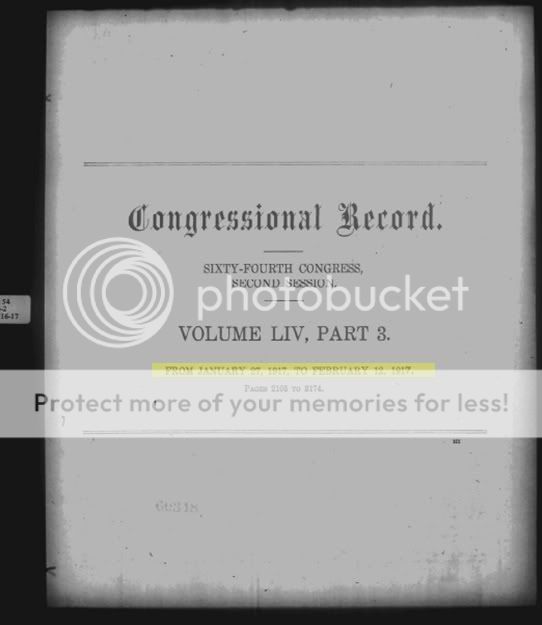
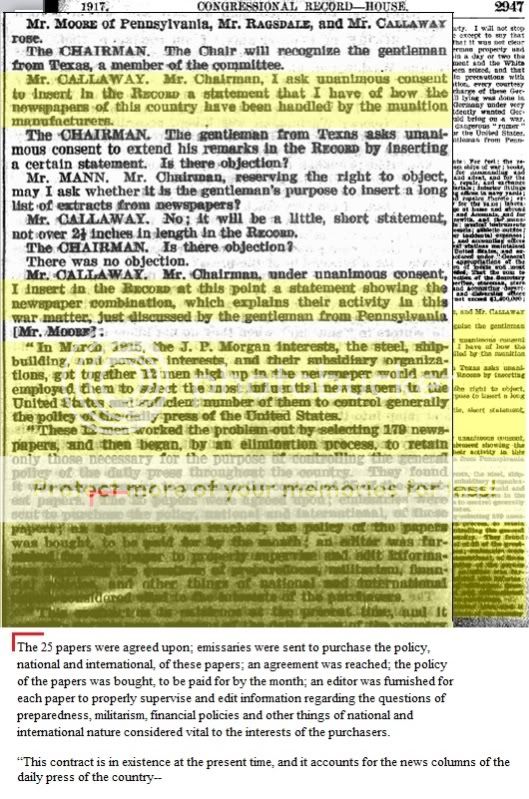
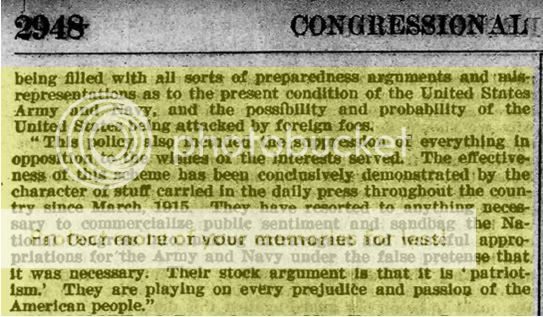
Now, Calloway goes on to discuss the danger of falsely reported events as a grounds for American sentiment accepting the United States entry into the ongoing WWI.
Interestingly enough, not even 2 months after Calloway's words are inserted into the official record, the United States of America declared war on Germany (April 6th, 1917)..
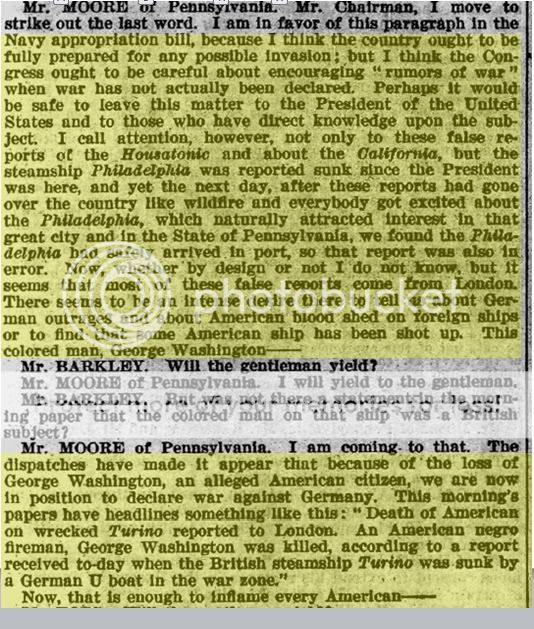
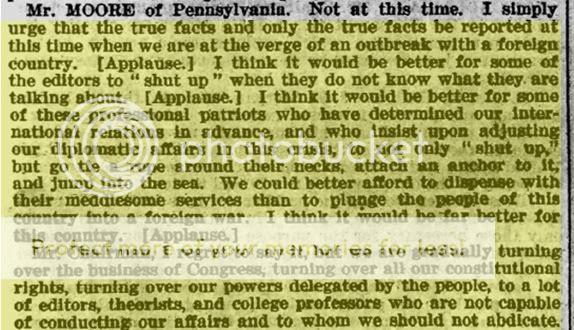
Your thoughts?
Good day...
I have seen this claim blasted all over various websites, over and over:
J.P. Morgan Interests Buy 25 of America's Leading Newspapers and Insert Editors
U.S. Congressional Record February 9, 1917, page 2947
Congressman Calloway announced that the J.P. Morgan interests bought 25 of America's leading newspapers, and inserted their own editors, in order to control the media.

The problem in my mind is the fact that this claim is extremely hard to verify online, let alone find any scans of this particular congressional record page showing the actual transcripts. This lack of source or substance is not a very good stance when dealing with the skeptics or "nay-sayers". So I decided to go to my local government depository and pull out the microfilm for this particular record.



Now, Calloway goes on to discuss the danger of falsely reported events as a grounds for American sentiment accepting the United States entry into the ongoing WWI.
Interestingly enough, not even 2 months after Calloway's words are inserted into the official record, the United States of America declared war on Germany (April 6th, 1917)..


Your thoughts?
Good day...
edit on 19-9-2011 by rstregooski because: ia
edit on 19-9-2011 by rstregooski because: photo
edit on 19-9-2011
by rstregooski because: text
No words of truth, statements of reason, or ideals of true freedom could over come the power of deep wealth.
I wonder if these elite just like the stage performance that politics was and is, their agendas manifest regardless.
I wonder if these elite just like the stage performance that politics was and is, their agendas manifest regardless.
reply to post by rstregooski
Well they sure as #@*& wasted their money...should have bought stock in Walmart or Apple...at least the internet since it has pretty much killed newspapers, television news, and radio for sure. There is no argument that certain powers invested in various media outlets over the years...some to exert influence others to make money. Newspapers were a good investment and yes perhaps they could install someone that would do their bidding but no absolutes as just like politicians editors could do whatever they want and many did and most still do. If something went down that meant the end of a politicians career they would jump on it with out doubt.
Well they sure as #@*& wasted their money...should have bought stock in Walmart or Apple...at least the internet since it has pretty much killed newspapers, television news, and radio for sure. There is no argument that certain powers invested in various media outlets over the years...some to exert influence others to make money. Newspapers were a good investment and yes perhaps they could install someone that would do their bidding but no absolutes as just like politicians editors could do whatever they want and many did and most still do. If something went down that meant the end of a politicians career they would jump on it with out doubt.
Ah, yellow journalism. That would not be the first time such meddling acts dragged us into a war we could have prevented. Try going back in time to
1898 with the sudden and mysterious explosion then sinking of the USS Maine; the media hungry for war insisted it was the Spanish and whipped the
American public into frenzy. They were able to put pressure on President McKinley to launch a war with Spain that was absolutely unnecessary and
avoidable. I am certain there were forces with invested interest in that event as well.
Yet this does not surprise me at all. The ‘Progressive Era’ was the beginning of our decline in nihilism and authoritarianism. We had all the right ingredients converging on our Republic at the same time. In the field of finance the Gilded Age had just come to an end with the Panic of 1893 (which itself could be a conspiracy since Cleveland was close with the railways) during which prices plummeted destroying farmers and indebting them, allowing private creditors to move in and take their land out from under them. As that occurred the East Coast banking and businesses establishments grew wildly as Americans suffered through what is historically termed the First Great Depression. They consolidated this wealth under the Presidency of McKinley, he was a true puppet and what made him so special? Well guess what, he wanted to win so badly against William Jennings Bryan that he began the era of big financing of political campaigns through his connections with industrialist Mark Hanna.
During his presidency we entered the Spanish-American War and helped suppress the Boxer Rebellion in China. He used the navy to collect private debts and is regarded as America’s first imperialist. This same imperialist dogma ran through Theodore Roosevelt and William Howard Taft. None of this could have been possible without the dramatic influence of public opinion held by William Randolph Hearst, whom at his peak owned 30 newspapers across the country. It would not surprise me the least if he was bought and paid for by higher ups, a mere front man. He is also a noted early Zionist. Not to mention he was an honorary member of the Bohemian Club, which is the sponsor of the Bohemian Grove meetings.
Enter Panic of 1907, as the trusts were going under in this banking panic J.P. Morgan stepped in after refusing to help the insolvent Knickerbocker Trust which set the whole thing in motion. Trust Company of America asked Morgan for help on October 22. That same evening he conferred with George F. Baker, President of First National Bank, James Stillman of the National City Bank of New York (Citibank), and the US Secretary of the Treasury, George B. Cortelyou. The Treasury Secretary agreed to deposit money into the Trust Company of America; how could he deny after Morgan already ‘rescued’ the US Treasury during the Panic of 1893 with his investments into it.
After large sums of money were poured into these banks they refused to make short-term loans which facilitated daily stock trades, thus the market crashed on October 24. So Morgan called on 14 big bankers again to invest $25 million into the markets to rescue them in 10 minutes, they gathered $23.6 million and thus bought up the stock markets, avoiding disaster. By the evening of October 25 the bankers formed two committees one to persuade clergy to calm their congregations on Sunday (i.e. bought up the preachers) and the other to explain various aspects of the rescue package to the press (i.e. bought up the press).
In a response to this Panic the bankers convened a secret meeting at Jekyll Island led by Senator Aldrich alongside A.P. Andrew (Assistant Secretary of the Treasury Department), Paul Warburg (Kuhn, Loeb, & Co.), Frank A. Vanderslip (President of National City Bank of New York), Henry P. Davidson (senior partner J.P. Morgan Company), Charles D. Norton (President of Morgan-dominated First National Bank of New York), and Benjamin Strong (representing J.P. Morgan). They traveled by train using fake names to meet in secret to discuss establishing a central bank in the United States as a response to the Panic. So much for the supposed efforts of Theodore Roosevelt to bust them up, I think he was a fraud especially considering:
"He (Theodore Roosevelt) got down on his knees to us. We bought the son of a bitch and then he did not stay bought." – Henry Clay Frick, steel magnate, referring to 1904 Presidential Election
The Federal Reserve Bill was passed on December 23, 1913 with the signature of President Wilson. This was one of the academic elites. He was the first US President and the only so far to have a PhD. As we can observe today with the masses of followers who cling to the words of our academic elite know-it-alls that claim the constitution is an old document which has outlived its purpose, Wilson was the first prominent figure to make such claims.
“How is the schoolmaster, the nation, to know which boy needs the whipping? ... Power and strict accountability for its use are the essential constituents of good government... It is, therefore, manifestly a radical defect in our federal system that it parcels out power and confuses responsibility as it does. The main purpose of the Convention of 1787 seems to have been to accomplish this grievous mistake. The "literary theory" of checks and balances is simply a consistent account of what our Constitution makers tried to do; and those checks and balances have proved mischievous just to the extent which they have succeeded in establishing themselves.”
As you can clearly see from our time spent during the Progressive Era and beyond, ruining our Republic, it was the cabal of editors, bankers, theorists, and university professors who worked together to dramatically change our country.
Yet this does not surprise me at all. The ‘Progressive Era’ was the beginning of our decline in nihilism and authoritarianism. We had all the right ingredients converging on our Republic at the same time. In the field of finance the Gilded Age had just come to an end with the Panic of 1893 (which itself could be a conspiracy since Cleveland was close with the railways) during which prices plummeted destroying farmers and indebting them, allowing private creditors to move in and take their land out from under them. As that occurred the East Coast banking and businesses establishments grew wildly as Americans suffered through what is historically termed the First Great Depression. They consolidated this wealth under the Presidency of McKinley, he was a true puppet and what made him so special? Well guess what, he wanted to win so badly against William Jennings Bryan that he began the era of big financing of political campaigns through his connections with industrialist Mark Hanna.
During his presidency we entered the Spanish-American War and helped suppress the Boxer Rebellion in China. He used the navy to collect private debts and is regarded as America’s first imperialist. This same imperialist dogma ran through Theodore Roosevelt and William Howard Taft. None of this could have been possible without the dramatic influence of public opinion held by William Randolph Hearst, whom at his peak owned 30 newspapers across the country. It would not surprise me the least if he was bought and paid for by higher ups, a mere front man. He is also a noted early Zionist. Not to mention he was an honorary member of the Bohemian Club, which is the sponsor of the Bohemian Grove meetings.
Enter Panic of 1907, as the trusts were going under in this banking panic J.P. Morgan stepped in after refusing to help the insolvent Knickerbocker Trust which set the whole thing in motion. Trust Company of America asked Morgan for help on October 22. That same evening he conferred with George F. Baker, President of First National Bank, James Stillman of the National City Bank of New York (Citibank), and the US Secretary of the Treasury, George B. Cortelyou. The Treasury Secretary agreed to deposit money into the Trust Company of America; how could he deny after Morgan already ‘rescued’ the US Treasury during the Panic of 1893 with his investments into it.
After large sums of money were poured into these banks they refused to make short-term loans which facilitated daily stock trades, thus the market crashed on October 24. So Morgan called on 14 big bankers again to invest $25 million into the markets to rescue them in 10 minutes, they gathered $23.6 million and thus bought up the stock markets, avoiding disaster. By the evening of October 25 the bankers formed two committees one to persuade clergy to calm their congregations on Sunday (i.e. bought up the preachers) and the other to explain various aspects of the rescue package to the press (i.e. bought up the press).
In a response to this Panic the bankers convened a secret meeting at Jekyll Island led by Senator Aldrich alongside A.P. Andrew (Assistant Secretary of the Treasury Department), Paul Warburg (Kuhn, Loeb, & Co.), Frank A. Vanderslip (President of National City Bank of New York), Henry P. Davidson (senior partner J.P. Morgan Company), Charles D. Norton (President of Morgan-dominated First National Bank of New York), and Benjamin Strong (representing J.P. Morgan). They traveled by train using fake names to meet in secret to discuss establishing a central bank in the United States as a response to the Panic. So much for the supposed efforts of Theodore Roosevelt to bust them up, I think he was a fraud especially considering:
"He (Theodore Roosevelt) got down on his knees to us. We bought the son of a bitch and then he did not stay bought." – Henry Clay Frick, steel magnate, referring to 1904 Presidential Election
The Federal Reserve Bill was passed on December 23, 1913 with the signature of President Wilson. This was one of the academic elites. He was the first US President and the only so far to have a PhD. As we can observe today with the masses of followers who cling to the words of our academic elite know-it-alls that claim the constitution is an old document which has outlived its purpose, Wilson was the first prominent figure to make such claims.
“How is the schoolmaster, the nation, to know which boy needs the whipping? ... Power and strict accountability for its use are the essential constituents of good government... It is, therefore, manifestly a radical defect in our federal system that it parcels out power and confuses responsibility as it does. The main purpose of the Convention of 1787 seems to have been to accomplish this grievous mistake. The "literary theory" of checks and balances is simply a consistent account of what our Constitution makers tried to do; and those checks and balances have proved mischievous just to the extent which they have succeeded in establishing themselves.”
As you can clearly see from our time spent during the Progressive Era and beyond, ruining our Republic, it was the cabal of editors, bankers, theorists, and university professors who worked together to dramatically change our country.
edit on 9/19/2011 by Misoir because: (no reason given)
I saw nothing in there about college professors. I did see a lot about corrupt, immoral wealthy elites and business people. The same wealthy elites
and business people who have bankrupted our country and are destroying the planet now.
reply to post by rstregooski
Thanks for your post. Long time ago I decided to avoid watching TV and buy newspapers, they only project a biased image.
Thanks for your post. Long time ago I decided to avoid watching TV and buy newspapers, they only project a biased image.
Someones been digging in the memory hole. Naughty, naughty, shouldn't do that. You are going to make people think too much now.
So many people understandably have no interest in history. It was presented, or not presented more like, as a series of dates and names in school. The need to learn them at a pace that eliminated the possibility of becoming interested in any one of them gradually conditions the automatic response of; "history is boring!" The schedule to learn was so stressed that no one with any memory left of their school years could argue that the teachers were trying, and under a great quota to cover a lot of material. So much material in fact that the student was guaranteed not to retain a thing very long after the test was over.
The motive for such an unenlightening curriculum? "Those who do not remember history are doomed to repeat it."
And repeating it we are. Right now we are repeating almost all the events which occurred between the two World Wars. The great struggle against the Central Bank (AKA the Federal Reserve Bank), the Great Depression, rampant unemployment, the Government providing aid to those who need it least, soup kitchens - I work in a grocery store, the lines have disappeared but they are still there in the form of EBT/Foodstamps, even the tent city on Wall Street. All repeats, and most of us are unaware, which means we are covering the same ground again.
There is one event that we aren't reliving right now, and that is the attempted coup that Brig. General Smedley Butler warned us about. I wonder why that is.
www.abovetopsecret.com...
So many people understandably have no interest in history. It was presented, or not presented more like, as a series of dates and names in school. The need to learn them at a pace that eliminated the possibility of becoming interested in any one of them gradually conditions the automatic response of; "history is boring!" The schedule to learn was so stressed that no one with any memory left of their school years could argue that the teachers were trying, and under a great quota to cover a lot of material. So much material in fact that the student was guaranteed not to retain a thing very long after the test was over.
The motive for such an unenlightening curriculum? "Those who do not remember history are doomed to repeat it."
And repeating it we are. Right now we are repeating almost all the events which occurred between the two World Wars. The great struggle against the Central Bank (AKA the Federal Reserve Bank), the Great Depression, rampant unemployment, the Government providing aid to those who need it least, soup kitchens - I work in a grocery store, the lines have disappeared but they are still there in the form of EBT/Foodstamps, even the tent city on Wall Street. All repeats, and most of us are unaware, which means we are covering the same ground again.
There is one event that we aren't reliving right now, and that is the attempted coup that Brig. General Smedley Butler warned us about. I wonder why that is.
www.abovetopsecret.com...
reply to post by Misoir
First thing that popped into my head too - Hearst's quote 'you supply the pictures, I'll supply the war'..
First thing that popped into my head too - Hearst's quote 'you supply the pictures, I'll supply the war'..
reply to post by rstregooski
Good find, now lets see about the do nothing readers, who beleive thier safe, at home with no jobs, and the media filtering info on americas future.
Good find, now lets see about the do nothing readers, who beleive thier safe, at home with no jobs, and the media filtering info on americas future.
reply to post by rstregooski
I know its a bit late, but S+F anyway. What a blast from the past! Can't say I know history very well, but it sure is interesting to find events of the past resemble so closely what is happening today! Unfortunately, there was no internet back then to help expose the truth...
I know its a bit late, but S+F anyway. What a blast from the past! Can't say I know history very well, but it sure is interesting to find events of the past resemble so closely what is happening today! Unfortunately, there was no internet back then to help expose the truth...
recent article on this subject
1917: J.P. Morgan bought US corporate media to be 1%’s lying sacks of spin?
1917: J.P. Morgan bought US corporate media to be 1%’s lying sacks of spin?
Congressman Oscar Callaway lost his Congressional election for opposing US entry into WW 1. Before he left office, he demanded investigation into JP Morgan & Co for purchasing control over America’s leading 25 newspapers in order to propagandize US public opinion in favor of his corporate and banking interests, including profits from US participation in the war. Mr. Callaway alleged he had the evidence to prove Morgan associates were working as editors to select and edit articles, with the press receiving monthly payments for their allegiance to Morgan....
*lots more, with links*
new topics
-
Driving home for Christmas… fast!
General Entertainment: 2 hours ago -
My Retirement
General Chit Chat: 3 hours ago -
‘Something horrible’: Somerset pit reveals bronze age cannibalism
Ancient & Lost Civilizations: 4 hours ago -
Spiritual Solstice
Short Stories: 6 hours ago
top topics
-
'Mass Casualty event' - Attack at Christmas market in Germany
Mainstream News: 16 hours ago, 28 flags -
My Retirement
General Chit Chat: 3 hours ago, 8 flags -
Driving home for Christmas… fast!
General Entertainment: 2 hours ago, 3 flags -
Spiritual Solstice
Short Stories: 6 hours ago, 2 flags -
‘Something horrible’: Somerset pit reveals bronze age cannibalism
Ancient & Lost Civilizations: 4 hours ago, 2 flags
active topics
-
US Federal Funding set to Expire December 20th. Massive CR on the way.
Mainstream News • 66 • : Skinnerbot -
Driving home for Christmas… fast!
General Entertainment • 2 • : Flyingclaydisk -
'Mass Casualty event' - Attack at Christmas market in Germany
Mainstream News • 113 • : xWorldxGonexMadx -
Post A Funny (T&C Friendly) Pic Part IV: The LOL awakens!
General Chit Chat • 7937 • : KrustyKrab -
Search to Resume for MH 370
Disaster Conspiracies • 10 • : nugget1 -
World's Best Christmas Lights!
General Chit Chat • 16 • : KrustyKrab -
My personal experiences and understanding of orbs
Aliens and UFOs • 24 • : trollz -
Drones everywhere in New Jersey ---and Elsewhere Master Thread
Aliens and UFOs • 207 • : 38181 -
‘Something horrible’: Somerset pit reveals bronze age cannibalism
Ancient & Lost Civilizations • 2 • : gortex -
Biden Nationalizes Another 50,000+ Student Loans as He Heads for the Exit
US Political Madness • 15 • : 38181
29
